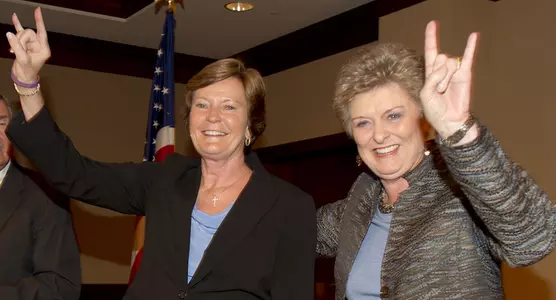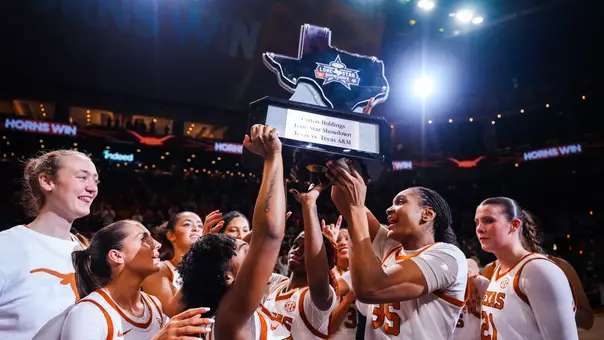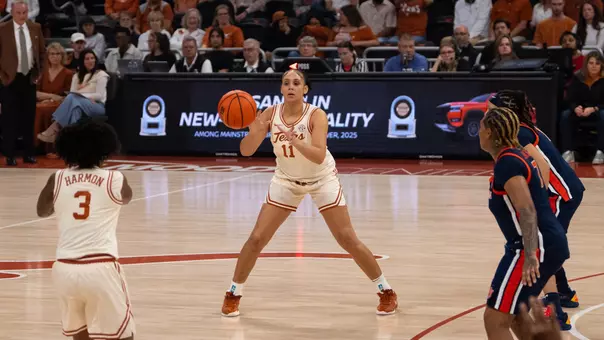The University of Texas at Austin Athletics

Friendship and rivalry sparked ascent of Women's Basketball
06.27.2016 | Women's Basketball
Jody Conradt reflects on friendship with former Tennessee head coach, who has recently been in declining health.
Statements from Aston, Conradt and Plonsky on Pat Summitt
AUSTIN – Long before they were inducted into a multitude of Halls of Fame, a pair of prominent women's basketball coaches made a successful attempt to enter into the Guinness Book of World Records.
The year was 1987 – just the sixth season since the NCAA began sponsorship of women's basketball – and the University of Tennessee had six days earlier christened Thompson-Boling Arena, a nearly 25,000-seat gem situated on the banks of the Tennessee River.
Tennessee coach Pat Summitt and Texas coach Jody Conradt, who had started an annual series in 1982, teamed up to break the world record for most fans at a women's basketball game.
They succeeded.
"There was a lot of buzz about the game and a huge crowd," Conradt said. "I remember Pat saying she had to walk the last few blocks to the game because the traffic was so bad."
Bolstered by a title sponsorship and a ticket giveaway from Wendy's, the fast-food hamburger chain, a then-record crowd of 24,563 fans watched the Longhorns' Clarissa Davis score 45 points to lead No. 2 Texas to a 97-78 upset of top-ranked and defending NCAA Champion Tennessee.
"After we won the game, we were excited and elated," Conradt said. "I took the team to eat at Wendy's because I thought there was a little irony to that."
* * *
It has been the premier rivalry in women's basketball that has stood the test of time. Tennessee and Texas have faced off for each of the last 34 years, but the matchup has always been about more than bragging rights.
It is a rivalry based in friendship, mutual admiration and, most importantly, one centered on growing the sport.
"That rivalry sort of set the stage for the emergence of women's basketball and I hope it set an example for even today's coaches," Conradt said. "Sometimes you have to look at what you do as being bigger than you or bigger than your individual institution. A rising tide raises the level of all boats and we sometimes forget that because we are more concerned with what is happening in our portion of the world."
Upon hearing the news Monday of the recent decline in Summitt's health, Conradt took the opportunity to reflect on her friendship with the former Tennessee coach, who always centered her focus on people – her players, her family and friends.
"My 30-plus year friendship with Pat Summitt is one I will always cherish, especially in a business that doesn't always breed genuine friendship," Conradt said. "It was evident, even in her early coaching years, that she'd leave her footprints on our game."
The two coaches had known each other for a number of years – they first met working a camp in South Carolina in the 1970s – when in 1982, they made a deliberate decision to schedule an annual meeting between their two teams. The two programs had met once before - in 1978 - in the Mid-American Classic in Columbia, Mo.
The climate surrounding the start of the series was much different than in present day. Just months earlier, Louisiana Tech defeated Cheyney State in Norfolk, Va., for the first NCAA Division I women's basketball championship. Resources were scarce for many programs and television coverage was virtually non-existent.
As they would their entire careers, Conradt and Summitt made a decision with global implications that would later prove monumental in increasing exposure and interest in collegiate women's basketball.
"We had been ranked really high and Tennessee had been ranked really high," Conradt said. "We had a conversation about what we could do to promote women's basketball. One of the things we thought would help would be to get really good teams to play each other and not be concerned about how that impacted the win-loss situation with either team.
"We wanted to do something for the greater good of the sport," she continued. "That was Pat and me, but it was also because of the support of the administrations at both institutions."
The two teams have met a total of 37 times, with the Lady Vols winning 23 and the Longhorns 14.
Regardless of the national rankings, records or expectations, the series has continued. That the annual matchup between the two teams will remain has never been questioned.
"There was a time when we were struggling and we weren't competitive," Conradt said. "There would be a temptation to say, 'I don't think we need to play this game because we can't compete,' or for their side to say 'This isn't helping us get better.' That has never even been a consideration for either side. We did this for the good of the game and it has been good for both programs."
* * *
Rewind to March of 1987 – just eight months before the historic regular-season match-up that would ensue at Thompson-Boling Arena – when Austin, Texas, and the Frank Erwin Special Events Center played host to the NCAA Division I Women's Basketball Final Four.
It was an event that on a multitude of levels demonstrated the rapid growth of women's basketball in the fifth anniversary of the sport's NCAA Championship status.
The host Longhorns were joined by Long Beach State, Louisiana Tech, and Tennessee. The Lady Vols, seeded second in the Mideast Region, became the first non-top seed in the event's short history to claim the national championship. It was the first of Tennessee's eight NCAA Championships won under Summitt's direction.
For the first time, the Women's Final Four was a sellout at 15,615 tickets, as fans from across the country poured into Austin to witness four powerhouse teams contend for the national title.
"That Final Four that Tennessee won was a huge statement for women's basketball," Conradt said. "There was a lot of hype and attention. [Former UT women's athletics director] Donna [Lopiano] and I went down and stood on the Red River Street side of the Erwin Center in front of the 'Sold Out' sign and had our picture made."
That Final Four marked the beginning of a run of impressive championship success for Summitt's Tennessee squads, but it was also a moment in time when it felt palpable that women's basketball was becoming a premier sport on the national scene.
It was an evolution of the sport in a broad sense, but it involved two programs – Tennessee and Texas – who had always been at the forefront of administrative support for women's basketball and female athletes.
"Texas Athletics always has felt a special competitive bond with Tennessee," said Chris Plonsky, University of Texas Director of Women's Athletics. "Administrations at both institutions made early commitments to supporting Title IX and opportunities for women in sport and education."
It was in that moment that the two coaches again teamed up to create an event that changed the course of the sport's history. For Summitt, it involved bringing home to Knoxville the first NCAA trophy in the program's history. For Conradt, and the administrative team at Texas, it involved revolutionizing the importance and feel of the sport's championship event.
"The game and sell-out were important, but I really believe that what we did with the [Women's Basketball Coaches Association] Coaches Convention made it seem like the biggest celebration ever," said Conradt, who one year earlier had led Texas to the first undefeated NCAA Championship in the sport's history. "We had a big party picnic in Centennial Park with Bevo there and we taught the teams how to Texas Two-Step. The band played there and we made it a really big deal.
"[Connecticut head coach] Geno [Auriemma] has talked to me a number of times about what an impact that Final Four had on him," Conradt continued. "I think a lot of coaches felt like we made it a big event in a sold-out arena and everyone is celebrating. They thought 'If it can happen in Austin, Texas, it can happen at my institution.' I really viewed that Final Four as a benchmark in terms of what happened after."
* * *
There were wins and there were trophies.
Conradt and Summitt combined for 1,998 career victories during their respective coaching careers. Both are members of both the Naismith Memorial Basketball Hall of Fame and the Women's Basketball Hall of Fame. The complete lists of accolades span far and wide.
Competing against Summitt was always a challenge, but it was one Conradt welcomed as an opportunity.
"You were going to face a team that was a reflection of Pat's personality," Conradt said. "They were going to be hard-working and they were going to do the hard things. They were really good defensively and they rebounded like crazy. It wasn't going to be something that was going to be beautiful offensively, but you were going to know you were in a battle."
After the battles had subsided and the two coaches retired, each had a statue erected in her honor on her respective campus. It was only fitting that Conradt and Summitt each invited the other to participate in the dedication ceremonies for their statues.
Several months after her retirement from the University of Tennessee and more than a year following the diagnosis that shocked the sports world, Summitt traveled to Austin for the ceremony to commemorate Conradt's unprecedented accomplishments at the University of Texas. One year later, Conradt would travel to Knoxville for the same purpose.
"I was very honored that Pat would come to Austin," Conradt said. "She was already having some health issues at that point. The fact that she would make the effort during what had already become difficult public appearances was extremely meaningful. The chance to reciprocate that [in November 2013] was very important and something I won't ever forget."
Those post-coaching appearances were fitting reminders of what the two coaches have always been about – a friendship amidst a rivalry and a dedication to growing the game.
"To me now, it's about friendship," Conradt said. "I don't think much about the rivalry or what happened in those games. I think about the friendship with Pat. It's hard to have true friendships when you're competing against somebody. Once I retired, I was able to fully celebrate her successes and be much more appreciative of the friendship that existed."
Despite the great quantity of accomplishments, it is the friendships and relationships that Summitt formed and the impact she has made on countless lives that will endure.
"In the coaching profession, one is judged by her victories and Pat's teams certainly won a ton of games," Conradt said. "But when I think about her greatest impact, I think about the young women she coached and mentored, and how fortunate they are to have had Pat as a leader and coach, and how blessed I have been to have her as a friend."





